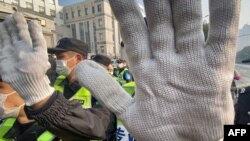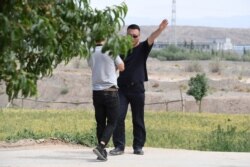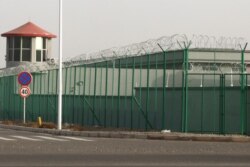China's propaganda machine has ramped up in the past week, targeting two foreign journalists with verbal and online attacks over their coverage of Uyghur Muslims in China's Xinjiang region.
Both John Sudworth, a journalist with the BBC, and Vicky Xu, a researcher and reporter based in Australia, have refused to be silenced by what Sudworth has referred to as China's "highly asymmetric battle for the control of ideas."
Sudworth, who reported from Beijing for nearly nine years, relocated with his family to Taiwan last week after an increase in legal threats and other pressure from authorities. His is the latest in a series of sudden departures by foreign media.
In an article, he said that China's "wolf-warrior" diplomats — a term referring to envoys using a more aggressive approach — have unleashed tweet-storms, lambasting foreign reporting including that of the BBC.
Beijing appears to view any China-based foreign correspondent as an "unwanted witness," said Cédric Alviani, East-Asia bureau director at Reporters Without Borders (RSF).
"The Chinese regime has been increasingly harassing foreign correspondents to ensure that it's as hard as possible for them to properly do their job," Alviani told VOA on Wednesday, adding that Sudworth's "forced departure" is a direct result of the harassment.
Beijing has expelled 18 foreign correspondents from China in the past year, Alviani said.
VOA's inquiries to Sudworth and Xu for comment went unanswered.
But in an article about his experience, headlined "The grim reality of reporting in China that pushed me out," Sudworth wrote that while "the space for foreign journalism is shrinking in China, the Communist Party has been investing heavily in its media strategy overseas, taking full advantage of the easy access to a free and open media."
China has denied that Sudworth was at risk. During a news briefing last week, the Foreign Ministry spokesperson Hua Chunying denied the government had threatened him.
"We heard that a few individuals and entities in Xinjiang may sue him over his slanderous reports. But that has nothing to do with the government," Hua said.
The spokesperson added that Sudworth should have stayed to prove his innocence in court.
But Sudworth, in his BBC article, described China's judicial system as lacking independence, saying it runs "as an extension of the Communist Party."
Online attacks
Researcher and journalist Xu, who lives in Australia, also found herself being targeted this week, as thousands of online trolls tried to discredit and smear her over reporting on the Uyghurs, including a 2020 article.
The trolling centered on "Uyghurs for sale," a report that she coauthored last year for an independent think tank, the Australia Strategic Policy Institute (ASPI). In it, Xu estimated that at least 80,000 Uyghurs were transferred out of Xinjiang to work in factories across China between 2017 and 2019.
"Under conditions that strongly suggest forced labor, Uyghurs are working in factories that are in the supply chains of at least 82 well-known global brands in the technology, clothing and automotive sectors," said the report.
ASPI said that it contacted the companies for comment, but only some replied. The report said a few brands instructed vendors to end relationships with the suppliers. Others said they had no direct contracts with those allegedly using the labor schemes. "No brands were able to rule out a link further down their supply chain," the report said.
As part of an apparent campaign to defend China's Xinjiang policies, state media and social media posts tried to discredit or smear Xu, calling her a "female demon," a "race traitor" and the brainchild behind Xinjiang's cotton controversy.
On Weibo, China's Twitter-like microblogging platform, more than 8 million users clicked on her name and stories publicly shaming her.
Xu, a 26-year-old journalist, was a party loyalist from Gansu province and trained in Beijing to become an English-language broadcaster before leaving China to report on human rights.
She responded to the attacks by mocking the trolls. On Tuesday, she tweeted that the attacks were "a wonderful way to alert the public something is up in Xinjiang, something echoing the cultural revolution and worse."
She also tweeted to clarify that her report focused on forced labor, exploited by the manufacturing sector, rather than the cotton industry in Xinjiang.
Xu has vowed to keep writing about Xinjiang until the camps are closed and forced labor ends.
China has long insisted that its camps in Xinjiang are meant to counter terrorism and alleviate poverty. But human rights groups have accused China of genocide by incarcerating at least a million Uyghurs.
Call to unite
Steve Chao, a freelance investigative journalist and former host for Al Jazeera English, said that restrictions imposed by China for accredited journalists are a "disappointing trend" that prevents a free exchange of ideas.
China appears to see foreign journalists as part of its growing tensions with Western governments, Chao said.
"I think the challenge for the Chinese government has always been whether they can actually separate the foreign press from Western governments because I think there's a perception that the media is a wing or arm of Western governments. There isn't a true sense that it is an independent entity," Chao told VOA over the phone.
China appears to have adopted a strategy to not only put forward its viewpoints, but also to silence opposition viewpoints by kicking journalists out or miring journalists and academics in lawsuits — a battle Chao said some media organizations lack the resources to fight.
Chao called for "a unified stand" against attempts by Beijing to chill free speech and view the foreign press as a threat.
Alviani of RSF echoed that view. He said that democracies should unite against China's attack on freedom of press and speech — universal rights enshrined in China's constitution and the Universal Declaration of Human Rights, which was signed by Beijing.
This article originated in VOA's Mandarin service.







